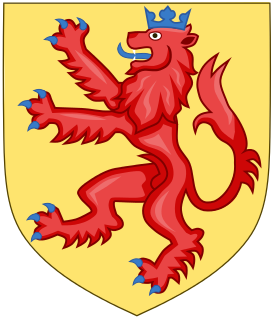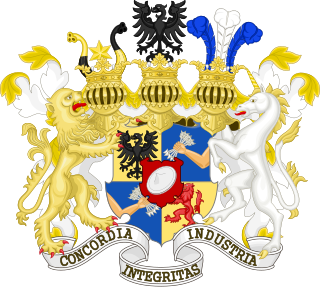
Confucius was a Chinese philosopher, poet and politician of the Spring and Autumn period who was traditionally considered the paragon of Chinese sages. Confucius's teachings and philosophy formed the basis of East Asian culture and society, and continues to remain influential across China and East Asia as of today.

The House of Habsburg, alternatively spelled Hapsburg in English; German: Haus Habsburg[ˈhaːpsbʊʁk](listen); Spanish: Casa de Habsburgo[aβzˈβuɾɣo]; Hungarian: Habsburg-család), also known as the House of Austria, is a German dynasty which was once one of the most prominent royal houses of Europe in the 2nd millennium.

The Indo-European languages are a language family native to western and southern Eurasia. It comprises most of the languages of Europe together with those of the northern Indian subcontinent and the Iranian Plateau. Some European languages of this family, such as English, French, Portuguese, Russian, Danish, Dutch, and Spanish, have expanded through colonialism in the modern period and are now spoken across several continents. The Indo-European family is divided into several branches or sub-families, of which there are eight groups with languages still alive today: Albanian, Armenian, Balto-Slavic, Celtic, Germanic, Hellenic, Indo-Iranian, and Italic; and another six subdivisions which are now extinct.

A language family is a group of languages related through descent from a common ancestral language or parental language, called the proto-language of that family. The term "family" reflects the tree model of language origination in historical linguistics, which makes use of a metaphor comparing languages to people in a biological family tree, or in a subsequent modification, to species in a phylogenetic tree of evolutionary taxonomy. Linguists therefore describe the daughter languages within a language family as being genetically related.

Flowering plants include multiple members of the clade Angiospermae, commonly called angiosperms. The term "angiosperm" is derived from the Greek words angeion and sperma ('seed'), and refers to those plants that produce their seeds enclosed within a fruit. They are the most diverse group of land plants with 64 orders, 416 families, approximately 13,000 known genera and 300,000 known species. Angiosperms were formerly called Magnoliophyta.

Charles Milles Manson was an American criminal who led the Manson Family, a cult based in California, in the late 1960s. Some of the members committed a series of nine murders at four locations in July and August 1969. In 1971, Manson was convicted of first-degree murder and conspiracy to commit murder for the deaths of seven people, including the film actress Sharon Tate. The prosecution contended that, while Manson never directly ordered the murders, his ideology constituted an overt act of conspiracy.

The British royal family comprises Queen Elizabeth II and her close relations. There is no strict legal or formal definition of who is or is not a member, although the Royal Household has issued different lists outlining who is a part of the royal family. Many members represent the British monarchy and support the monarch in undertaking public engagements and often pursue charitable work and interests. The royal family are regarded as British cultural icons.

In some cultures, a surname, family name, or last name is the portion of one's personal name that indicates one's family, tribe or community.

The Rothschild family is a wealthy Ashkenazi Jewish family originally from Frankfurt that rose to prominence with Mayer Amschel Rothschild (1744–1812), a court factor to the German Landgraves of Hesse-Kassel in the Free City of Frankfurt, Holy Roman Empire, who established his banking business in the 1760s. Unlike most previous court factors, Rothschild managed to bequeath his wealth and established an international banking family through his five sons, who established businesses in London, Paris, Frankfurt, Vienna, and Naples. The family was elevated to noble rank in the Holy Roman Empire and the United Kingdom. The family's documented history starts in 16th century Frankfurt; its name is derived from the family house, Rothschild, built by Isaak Elchanan Bacharach in Frankfurt in 1567.

Family Guy is an American adult animated sitcom created by Seth MacFarlane and developed by MacFarlane and David Zuckerman for the Fox Broadcasting Company that premiered on January 31, 1999. The series is produced by Fuzzy Door Productions.

A dynasty is a sequence of rulers from the same family, usually in the context of a feudal or monarchical system, but sometimes also appearing in republics. Alternative terms for "dynasty" may include "house", "family" and "clan", among others. The longest surviving dynasty in the world is the Imperial House of Japan, otherwise known as the Yamato dynasty, whose reign is traditionally dated to 660 BC and historically attested from 781 AD.

Seth Woodbury MacFarlane is an American actor, screenwriter, producer, film director, singer, and animator. He is the creator of the television series Family Guy (1999–present) and The Orville (2017–present), and co-creator of the television series American Dad! (2005–present) and The Cleveland Show (2009–2013). He also wrote, directed, and starred in the films Ted (2012), its sequel Ted 2 (2015), and A Million Ways to Die in the West (2014).

Heterodonta is a taxonomic subclass of saltwater clams, marine bivalve molluscs. This subclass includes the edible clams, the cockles and the Venus clams.
In human society, family is a group of people related either by consanguinity or affinity. The purpose of families is to maintain the well-being of its members and of society. Ideally, families would offer predictability, structure, and safety as members mature and participate in the community. In most societies, it is within families that children acquire socialization for life outside the family, and acts as the primary source of attachment, nurturing, and socialization for humans. Additionally, as the basic unit for meeting the basic needs of its members, it provides a sense of boundaries for performing tasks in a safe environment, ideally builds a person into a functional adult, transmits culture, and ensures continuity of humankind with precedents of knowledge.
The American Mafia, commonly referred to in North America as the Italian-American Mafia, the Mafia, or the Mob, is a highly organized Italian-American criminal society and organized crime group. The organization is often referred to by its members as Cosa Nostra and by the American government as La Cosa Nostra (LCN). The organization's name is derived from the original Mafia or Cosa nostra, the Sicilian Mafia, with "American Mafia" originally referring simply to Mafia groups from Sicily operating in America, as the organization initially emerged as an American offshoot of the Sicilian Mafia. However, the organization gradually evolved into a separate entity partially independent of the original Mafia in Sicily, and it eventually encompassed or absorbed other Italian-American gangsters and Italian-American crime groups active in the United States and Canada that were not of Sicilian origin. In North America, it is often colloquially referred to as the Italian Mafia or Italian Mob, though these terms may also apply to the separate yet related Sicilian Mafia or other organized crime groups in Italy or ethnic Italian crime groups in other countries.

19 Kids and Counting is an American reality television series that aired on the cable channel TLC for seven years until its cancellation in 2015. The show features the Duggar family: parents Jim Bob and Michelle Duggar and their 19 children – nine daughters and ten sons – all of whose names begin with the letter "J". During the duration of the show, two children were born, three children were married and four grandchildren were born.
Modern Family is an American family sitcom television series created by Christopher Lloyd and Steven Levitan for the American Broadcasting Company. It ran for 11 seasons, from September 23, 2009, to April 8, 2020. It follows the lives of three diverse family set-ups in suburban Los Angeles, linked by patriarch Jay Pritchett.

Nicholas II or Nikolai II Alexandrovich Romanov, known in the Russian Orthodox Church as Saint Nicholas the Passion-Bearer, was the last Emperor of Russia, King of Congress Poland and Grand Duke of Finland, ruling from 1 November 1894 until his abdication on 15 March 1917. During his reign, Nicholas gave support to the economic and political reforms promoted by his prime ministers, Sergei Witte and Pyotr Stolypin. He advocated modernization based on foreign loans and close ties with France, but resisted giving the new parliament major roles. Ultimately, progress was undermined by Nicholas's commitment to autocratic rule, strong aristocratic opposition and defeats sustained by the Russian military in the Russo-Japanese War and World War I. By March 1917, public support for Nicholas had collapsed and he was forced to abdicate the throne, thereby ending the Romanov dynasty's 304-year rule of Russia (1613–1917).

Dicerocardium is an extinct genus of fossil saltwater clams, marine heterodont bivalve molluscs, in the family Dicerocardiidae. These bivalves were stationary semi-infaunal suspension feeders.
Megalodontoidea is a superfamily of fossil bivalves in the order Megalodontida.
















